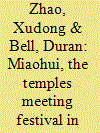| Srl | Item |
| 1 |
ID:
167932


|
|
|
|
|
| Summary/Abstract |
Mao Zedong's historic swim in the Yangtze River on 16 July 1966, which heralded a new phase of the Cultural Revolution, was a carefully staged political performance and a notable example of body politics in Communist China. Beginning in the late 1950s, Mao began to broadcast the idea that he was a keen swimmer and to convince the masses to take up swimming. The swim was the climax of those efforts and an integral part of the Mao cult. Swimming in Mao's China offers a useful lens for understanding the close relationship between sports, the body, and politics. Swimming was a means for Mao to mobilize mass support for his political authority and a venue for the masses to practise and perform Maoism. This article examines the constructive process and meanings of Mao's swimming body, and the extent to which the bodies of the populace were regulated through the mass-swimming craze. Drawing on untapped archival materials related to mass swimming in Mao's China, this article argues that swimming both solidified and destabilized the Mao cult and became a venue through which political values were shaped, indoctrinated, contested, and repudiated.
|
|
|
|
|
|
|
|
|
|
|
|
|
|
|
|
| 2 |
ID:
079929


|
|
|
|
|
| Publication |
2007.
|
| Summary/Abstract |
We examine the multiple purposes and modalities that converge during a circuit of festivals, miaohui, which temples organize in recognition of local gods and which are attended reciprocally by temple representatives from the surrounding area in North China. The festivals involve intense expressions of devotion to one or more deities, while offering an opportunity for representatives of other villages to seek recognition through rather boisterous drumming and prolonged choreographed dancing. We note also the emergence of Mao as a great god whose legacy as Chairman of the CCP is projected in order to legitimate current Party leadership and their policy of reform while concurrently acting as a powerful denial of those same policies from the perspective of villagers.
|
|
|
|
|
|
|
|
|
|
|
|
|
|
|
|